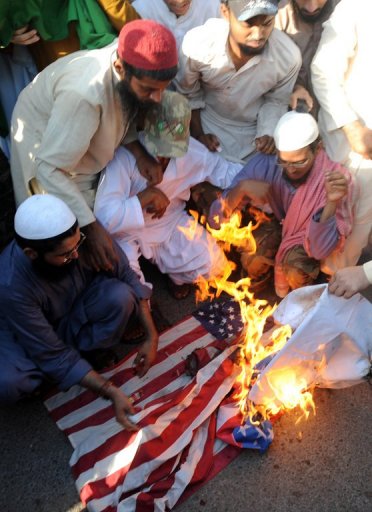For as long as Pakistan has existed, film lovers flocked to the Nishat cinema, sinking into seats in its plush auditorium to watch Hollywood imports, Bollywood hits and homegrown productions.
All that came to an end last month when an enraged mob set fire to the building, trashed furniture and looted equipment — all in the name of defending the Prophet Mohammed and protesting against a cheap American web trailer that infuriated Muslims.
Eight other cinemas were destroyed — in the conservative, northwestern city of Peshawar and the more cosmopolitan financial capital Karachi — dealing a huge blow to Pakistan’s already troubled film industry.
The arson and vandalism has cost scores of jobs and leaves even fewer sources of secular entertainment in a country where a conservative right-wing Islamist agenda whips up the street, and moderates are sidelined in public discourse.
The auditorium which once held 1,000 seats is now a mess of rubble, twisted metal and up-ended chairs. Its staircase is crumbling and its projector room destroyed.
What remains of the gallery could collapse at any time. Fire destroyed the cinema’s beautiful ornate ceiling. The giant screen is gone. The wall behind is blackened.
Workers say September 21 was the worst physical attack on cinemas in Pakistan’s 65-year history and another setback for a film and entertainment industry that has been nearly stripped bare by decades of Islamisation.
When General Zia ul-Haq seized power in a bloodless coup in 1977, the country had around 1,000 cinemas. Today, there are just over 100 left.
Pakistan banned Bollywood films in 1965, and although exceptions were made for individual films, Zia is credited with making Pakistan more right-wing, more Islamic and less tolerant of secular entertainment and of minorities.
His 11-year dictatorship coincided with Pakistan’s sponsorship, along with the CIA and Saudi Arabia, of jihad against the Soviets in Afghanistan that ultimately gave rise to Al-Qaeda and the Taliban.
Film production houses in Lahore and Karachi went into decline.
In 2009, the newly elected civilian government lifted the blanket ban on Indian films, wildly popular in Pakistan, and cinemas began to hope that their fortunes might improve despite a Taliban insurgency that has killed thousands.
Now they are not so sure.
Among those destroyed was the Bambino, formerly owned by the father of President Asif Ali Zardari in a building where the president once lived with his parents.
Comic actor Umer Sharif believes lack of entertainment is one factor that sees young men fall into delinquency and militancy.
Others are just sad.

COMMENTS
Please let us know if you're having issues with commenting.